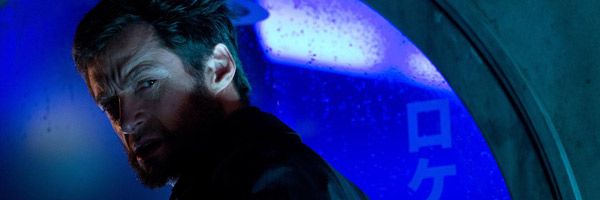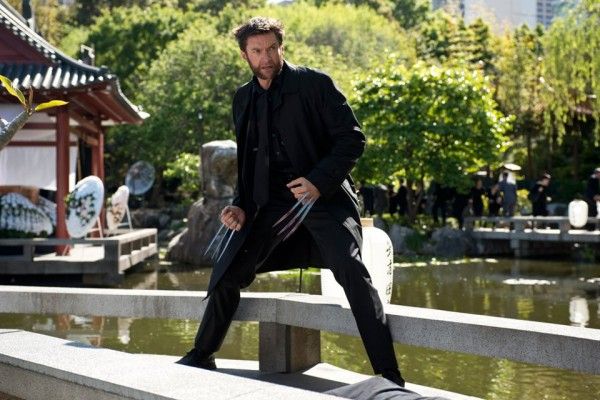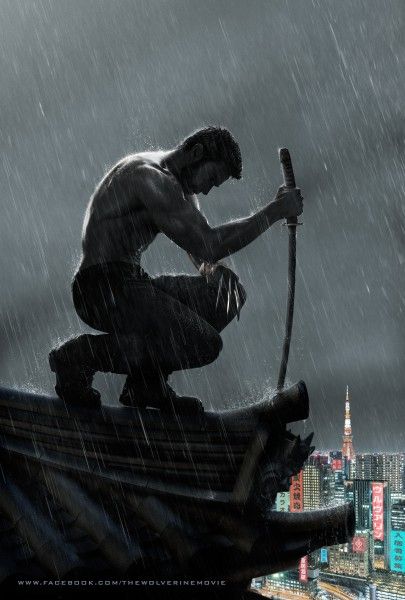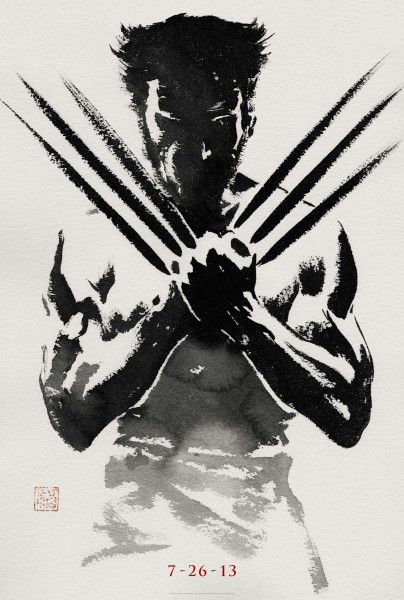Many people have wondered where and when The Wolverine takes place in the X-Men movie timeline, and how much influence the Chris Claremont/Frank Miller Wolverine comic book series had on the story. During an on-set interview in Sydney last year, I participated in a group interview with Hugh Jackman. He explained while they had to change some of the storyline, "There's definitely a lot of similarities. More similarities than differences. The fans will definitely be excited by it." He also told us:
"I think one of the keys to me in signing on to this movie was that we had a very strong idea and we had a strong approach to the story. That we really went from something new and different, and the moment the studio agreed to call it The Wolverine, I was just thrilled, rather than saying Wolverine 2. This is a standalone movie. This is set in a different time. It's fairly after X-Men Origins, we're in a different location with Jim Mangold, who's a terrific director, we have a visual style that is different from all the other X-Men movies. I think it's going to feel very fresh."
Jackman also talked about the challenges of bringing this new spin-off to movie screens, what makes him "The Wolverine," the humor and Logan's irreverent side, and so much more. Hit the jump for the interview.
Before getting to the interview, watch the recent trailer:
Question: This is a project that has gone through a little bit of development hell. You had multiple directors, a lot of people working on the script.
HUGH JACKMAN: Does two make multiple?
Yes. What's it like for you finally being on set filming this thing?
JACKMAN: Fantastic. It's weird. Maybe on paper it would look like as you described it, but in reality, apart from the long gestation, it has felt in a way the most secure because the Chris McQuarrie script that was first delivered was so fantastic, which was why Darren Aronofsky came on board. For some reasons, he couldn't continue, and then obviously there were delays, there were some delays in my schedule, there were delays here and there. There was never a doubt that the movie was going to be made, so I never had that worry. Fox was committed to it. For me the whole thing was worth the wait. I waited in a way 12 years for this chapter in this saga, for this samurai story, from the very first week I had on X-Men 1. I was reading this comic and Lauren Shuler Donner and I were saying, one day hopefully we get to do this story. So I think maybe in the past we've had times where we've had late changes in director or whatever, but we've been backed into a release date, so we've had to push. It was nice to know that we started with something really solid.
You are Wolverine. Look at the Hulk, that's been recast three times. But even in X-Men: First Class, you had one line and people were saying it was the greatest line in the film. What makes you Wolverine?
JACKMAN: Well, first of all, you always look at the pedigree of anything and the character itself in the comic book series is incredibly popular, so I could never take sole credit for any of that. I'm really pleased the fans have similarly embraced me in the part because I love playing the part. I never thought my run would last this long. To be a guy who can't age, obviously there is a shelf life for playing this role, so I love it. I've always found it fascinating and slightly, I'll admit, frustrating that I feel we've never really delivered what I would say is the core of the character. And I think in this story, you get to see the ultimate Wolverine. You get to see who he really is. You definitely see him at his most vulnerable, both physically and emotionally. As we were saying before, we had the preparation time so we were really in great shape, and I may be going off the question a little bit, I'm sorry, I feel really blessed in a way to have had the opportunity. I know a lot of the Wolverine fans. I've met many of them. They've told me exactly what they think of the movie, every scene, whatever. Lucky for me so far, there hasn't been major disappointment because I'm pretty sure I'd get spat on in the street. That's the level of passion involved. So I'm happy.
What's prevented you from playing the real Wolverine before?
JACKMAN: In the X-Men movies, the movie's called X-Men, so there are many characters and many character arcs, and actually the real difficulty with that is serving up as many different story lines in one and keeping the overall world of mutants and the world of X-Men in play. So, very difficult task. Bryan Singer did a brilliant job. We were also setting a tone that didn't exist back then. There was no Chris Nolan. The idea that you could have a movie where you cared about the characters didn't exist. So give him a lot of credit for what he created there. I think for whatever reason, there were a number of things working against us at the time in X-Men Origins: Wolverine. We all put our heart and soul into it, I just honestly when I watched it I went, I still don't feel like we've really delivered who my vision of who this character is. I think we've got another shot at it.
Talking about who he is, on one level, the claws are very literal, but on another they express an idea. What are they? What's the metaphor?
JACKMAN: There's a number of things in play here. One of them is the human-animal tussle that's going on in him. Which, on a far smaller scale, we all have, even on a day-to-day basis. It's the chaos-control theory. The claws are an embodiment of the animalistic side. They come out generally with rage, that internal rage. Wolverine's a character who's at war with himself, as much as anything. In a way you could say his greatest enemy is himself. In this movie, you definitely see him at his lowest point. He's without purpose. He's without a reason in the beginning. Through the samurai story and through being in this foreign land, he's fired to embrace who he is -- or not. I don't want to give that away. But you're right, Wolverine hasn't got the most spectacular of all the X-Men. He can't fly, he can't jump, he can't shoot laser beams. He's got a healing ability, which is fantastic, and he has these claws. I think his greatest weapon is who he is inside regardless of… If you took away all their powers, I'm pretty sure of all the X-Men, Wolverine is the one you don't want to piss off. He's the one you want on your side and definitely not against you because he won't stop until he's dead -- or you're dead.
You've got a reputation for being a nice guy in the industry, but as you're saying Wolverine is this dark, brooding character. Where do you pull that from?
JACKMAN: I'm an actor, man. Never trust an actor, whatever their energy is. I suppose you guys see that side of me, but I'm sure there's plenty of people close to me who've seen the other one. I think if we're all honest with ourselves, we all know that internal rage. I think one of the things I always loved about the comics was this idea that this character, when he goes berserk, that white, blind rage makes him incredibly powerful, but it's also a great flaw. It's almost like he loses consciousness of what he's doing. During that he can do great damage. I can remember that vividly at times. Usually, luckily for me, that took place on a rugby field, where it's somehow sanctioned, all this violence. On some level, it has to exist. On many levels, you have to imagine it. That's why I got in this business. There's many, many things that could get me to that kind of rage.
Wolverine is actually quite funny. Is this irreverent side going to be a part of this film?
JACKMAN: Yeah, I would say the film's got a generally darker overtone to it. Also, as I said, you see him at a much lower eb. Jim and I were very adamant that any one-liners overcome the expense of what is really going for him in a realistic sense, usually that's what happens a lot. The ones who are more deeply, internally in pain, can on the surface be more sardonic, can quip and make one-liners. The trick is really getting that line right, where all of a sudden it doesn't become just hammy. So we constantly ad lib. I find myself ad-libbing a lot and probably 90% of them end up on the cutting room floor. I remember X-Men 1 most of the funny lines were ad-libbed. Sometimes they work.
How do you stay so physically fit to play Wolverine?
JACKMAN: Ugh. It gets hard, let me tell you. Basically one of the great things about having the preparation is I really probably started months ago, when I first thought we were about to gear up and go. And this year, I've been eating incredibly strictly probably since January. I've changed my training for this. Over the years, I've got smarter with it. Unfortunately, I realized I needed to train a little more to get what I wanted for this, which was a leaner, more animalistic look. And I want to be as big as I possibly could be, which is hard for me because I'm skinny. So I started eating six, seven meals a day from January and training about three hours a day.
There was some talk that you were doing the Dwayne Johnson diet.
JACKMAN: Oh, I rang Dwayne for help because I saw him between these two movies, the two Fast and Furious movies, and he put on 25 pounds, which in muscle is a lot. It really is hard to put on that amount of muscles. He did it in six months. He sent me his entire thing, so I followed that. You got to adjust to yourself.
Is Wolverine supposed to learn martial arts in this movie?
JACKMAN: That's a great question because no one is simplistically just saying he becomes a martial artist or he becomes a samurai. What happens is Wolverine is a warrior by nature. His weapons, his strength is not pretty. It's not formed so much, it's more instinctive, a little more brutal. I think I've told you guys before I used to watch a lot of Mike Tyson videos, that's what I've tried to model Wolverine on. What happens in this story, which follows on from the comic book arc, is actually he realizes that doesn't always work for him and sometimes a more efficient, more disciplined approach of a samurai is more effective. He learns his lesson in a painful way and he adapts. That's one good thing about Wolverine, he adapts. I'm not going to say he's going to finish a triple black belt, but you do see him adjust, so I've been learning a lot for this, which is great.
The X-Men series was a metaphor for racial tolerance, is there some larger themes like that in this film?
JACKMAN: You know, I would say the overtone in this movie probably spans a little more from that idea of discrimination and minorities to more of life and death and more elemental questions of why we live, what's our purpose, why are we here, who are we, that kind of thing, which is the battle Wolverine is struggling with. It's funny, we just did a scene where he's questioned about his kind. It bristles. It still obviously is there, it's part of the X-Men lore. I think this probably is even deeper than that.
I'm curious, obviously you guys have been working on the script for two years. You've been able to refine it. How much is the film that you're making today what you set out to make two years ago? How many tweaks have you done? I'm also curious how much influence Chris Claremont had on this one.
JACKMAN: I don't know if all you guys know the original comic book series. It's not just one. There are reasons we've had to change it, which I don't want to give away. There's definitely a lot of similarities. More similarities than differences. But for the purpose of story in the film and not a more rambling arc that goes on, it has been changed. The fans will definitely be excited by it. They will definitely see more similarities than not. In terms of refining the script, I think one of the keys to me in signing on to this movie was that we had a very strong idea and we had a strong approach to the story. That we really went from something new and different, and the moment the studio agreed to call it The Wolverine, I was just thrilled, rather than saying Wolverine 2. This is a standalone movie. This is set in a different time. It's fairly after X-Men Origins, we're in a different location with Jim Mangold, who's a terrific director, we have a visual style that is different from all the other X-Men movies. I think it's going to feel very fresh. What Chris McQuarrie did with it, which I don't know if many of you know, was also involved with X-Men 1, not credited in the end, he had very strong ideas and a lot of that is there. Things were refined, but that's because of time. It's so hard. I want to give you more details. I'm sure you'd let me give you more details, but I see five people hovering, pretending it's lunch, but it's not really. [Laughs].
The Wolverine opens July 26th. For more from our set visit:
- 40 Things to Know About THE WOLVERINE From Our Set Visit
- Director James Mangold Talks Making a Noir Film in Japan, Visual Style, 3D, the Rating, the Comics Influence, and More on the Set of THE WOLVERINE
- Producer Hutch Parker Talks the Long Development Process, Continuing to Develop the Third Act During Production, and More on the Set of THE WOLVERINE
- Tao Okamoto Talks Making Her Acting Debut on an X-MEN Movie, Taking Advice from Hugh Jackman, and More on the Set of THE WOLVERINE
- Svetlana Khodchenkova Talks Playing Viper, Landing the Role, Her Costume, Working with Hugh Jackman, and More on the Set of THE WOLVERINE
- Rila Fukushima Talks Fight Sequences, Similarities to the Comic, Working with Hugh Jackman, and More on the Set of THE WOLVERINE




